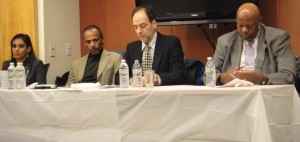By Uchenna Ekwo
In A Culture of Secrecy: The Government Versus the People’s Right to Know, Athan G. Theoharis examined the secrecy perpetrated by successive US administrations of Nixon, Reagan, Bush, and Clinton. Contributing scholars, journalists, and attorneys reviewed different policies of previous US governments and brought to focus the constant conflict between the public’s right to know and government spin masters who obfuscate, hide, and warp the truth. All the essays in the book clearly illustrate an abuse of the Freedom of Information Act by withholding information that has nothing to do with national security.
With the prevalence of secrecy in an advanced democracy like the United States, one could only imagine the extent to which most emerging countries grapple with a more sinister culture of secrecy. In most African countries for example, there is a lack of openness that often breeds corruption and misrule. The culture of secrecy is sometimes overstretched to ludicrous heights where citizens are not allowed to know the travel plans of their leaders, birthdays of their leaders or even to ask questions about the health of their leaders.
Cameroon’s President Paul Biya who has been in power for over 30 years was recently reported to have gone on vacation for several months in one European country and his fellow citizens dared not ask questions.
Recently, former Nigeria’s president, the late Shehu Musa Yaradua was reportedly bed-ridden in a hospital in Saudi Arabia for many months and his sickness was concealed from the citizens. Speculations went wild in the media around the world about the absence of the then president. It was such a shame that even his Vice President did not have enough information about the whereabouts of his boss at the time. Even at death, the Nigerian leader was secretly flown home to the nation’s airports under darkness caused by power outage in the entire airport.
Barely three years after the drama associated with former President Yaradua who was succeeded by the current President Goodluck Jonathan— two governors in Nigeria, Liyel Imoke of Cross River and Sullivan Chime of Enugu States are playing the same ostrich. The duo have been absent from office for several months fuelling speculations about their death.
Yet, the authorities in Calabar and Enugu or should I say the spin doctors in the states’ capitals are manipulating fellow citizens by manufacturing all sorts of stories ranging from the governors being on vacation to asking citizens not to bother about their leaders’ whereabouts.
Media reports in Nigeria clearly show mounting anxiety among the populace about the current state of their governors. For example, in Enugu State where the Governor has not been seen for over 110 days, a group calling itself Save Enugu Group (SEG) is exerting sufficient pressure on the government and demanding full disclosure about Governor Chime.
Rather than addressing the issue of whether the governor is sick and in which hospital, I found it bizarre and embarrassing that the government spokesman, Achife would impugn the motives of fellow citizens who are genuinely interested in the welfare or health of their leader.
This is axiomatic of everything wrong about governance in fledgling democracies. The arrogation of some individuals to a god status makes mockery of the notion of equality before the law in a constitutional system. A governor is a human being in the first place and like all human beings could fall sick anytime, anywhere, anyhow, and be treated in a hospital like other mortals. To hide the sickness of a leader amounts to taking us back in the ages where leaders were seen by their subjects as omnipotent and omniscient. Today the landscape has changed and citizens are empowered by different disruptive communication technologies that help in sharing information and destroying long held myths of leaders. They can question obfuscation, misinformation, and propaganda.
Smart leadership in contemporary times requires a high degree of transparency. It is a national embarrassment that leaders should abscond from their duties for unexplained circumstances. Citizens have a right to know about the health status of their leaders. It is not too much of a demand. At least, if they are denied information about financial transactions that government officials engage in on their behalf, they should not be denied simple information about the health and whereabouts of their leaders.
It may be appropriate to suggest that before anyone aspires to a public office, the individual should do a medical examination that should be published publicly. Such information could be a consideration for some voters who may cast their ballots to a candidate on the basis of sound health. After all, private and public companies require potential employees to present their health records prior to employment. Why can’t aspirants to higher and more demanding public offices be required to do so knowing that avoiding it could potentially cause a national embarrassment like the case of Governors Imoke and Chime.
President Goodluck Jonathan whose deceased boss played similar tricks on Nigerians must rise to the occasion and call out these governors who are smearing Nigeria’s image with their opaque leadership. I believe he knows where they are hiding. If they are sick, they should tell their citizens so they can put them in their thoughts and prayers. On the other hand, if they are sick and there is little hope about their coming back to govern, the governors should resign to take care of their health issues. The state is above an individual. The frustration, anxiety, and perfidy associated with all this charade should end. The era of secrecy is gone. This is time for openness.
A former US Supreme Court Justice Louis Brandeis said it best when he uttered his famous words, “sunlight is the best disinfectant”. A spotlight is needed in the dark corners of globe.






